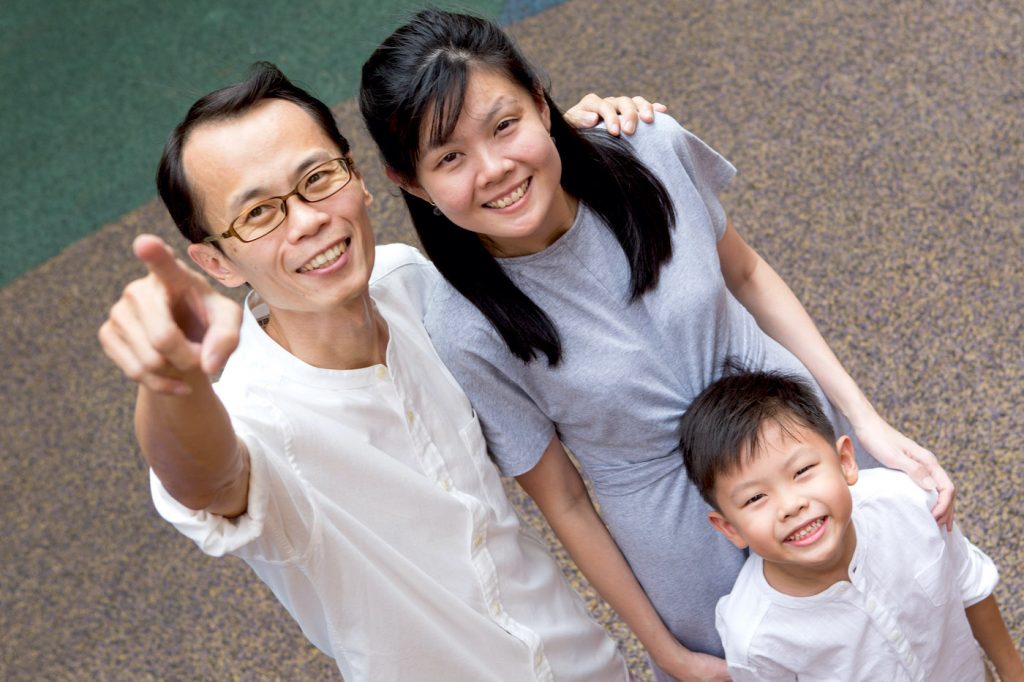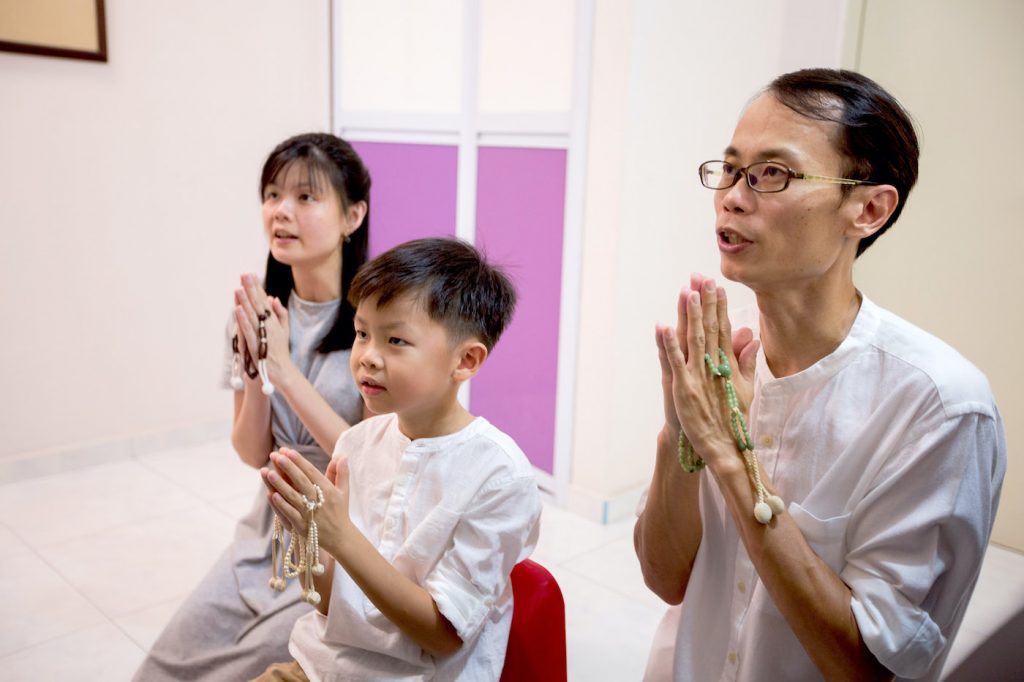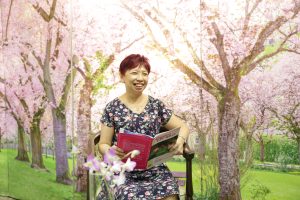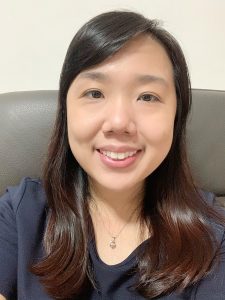
Lim Ben Tah, Yew Siew Yin and Zavier Lim (Family of 3)
Young Men Division, Women Division and Primary Division
The image of a family of three doing gongyo and chanting daimoku happily and harmoniously is a warm and inspiring sight. When asked how they started their faith, the husband, Lim Ben Tah, shared with gratitude.
Ben Tah: My mother became depressed after divorcing my father around 1995. She often had nightmares and was unable to sleep at night, and would only sleep during the day. Her day and night were reversed and she became depressed. A grocery store owner happened to share Nichiren Buddhism with her and she took up faith. As my mother increased her daimoku from five minutes to an hour daily, she became more cheerful. She overcame her depression and singlehandedly raised her four children.
However, being a science student, I felt that religion had no scientific basis. In addition, discordant relations in the family more or less shaped my pessimistic and inferior personality. I did not trust people and was unwilling to come into contact with them. My mother enabled my three siblings to start chanting but I was the only one who was reluctant to take up faith. Nonetheless my mother continued to arrange for Young Men Division (YMD) leaders to contact me. I also felt that people only made friends to serve their own interests. Regardless of how cold or patronising my attitude, the YMD leaders continued to contact me and invited me to participate in Gakkai activities.
My turning point in faith came in 1998 when I was 18 years old. I participated in a performance by Soka Gakkai Malaysia (SGM) in the Commonwealth Games. There were 5,000 performers putting up a human graphic performance. The warmth and care of the members, though strangers to me, touched me and helped to regain my trust in people. I later joined the YMD gymnastics group, and started practising faith. I also subsequently took up leadership in Gakkai. Through these engagements, I came to realise that the greatness of Nichiren Buddhism lies in advocating that everyone inherently possesses Buddhahood, and can manifest strength such as courage, wisdom, compassion and good fortune to solve various problems encountered in life.
When Siew Yin and I were about to get married. I felt that the greatest happiness in the family would be to have my life partner take up faith too, so I chanted one million daimoku for her to meet the “good influence” in life to take up faith.
Siew Yin: In actual fact, my friend had invited me to Gakkai activities when I was in secondary school, but I did not take up faith. It was only when I started working that I began to attend Gakkai activities. I got to learn more about Nichiren Buddhism when I met my husband. I witnessed how my mother-in-law transformed her life through Buddhism, and developed a strong and optimistic outlook on life, which impressed upon me the greatness of this faith. But I became busy with life after marriage and I only chanted occasionally even though I knew that this Buddhism is beneficial. It was because of my son, Zavier, that I became more consistent in daimoku chanting and participated actively in activities.
Zavier used to be a very quiet and shy child when he was young and he did not like to participate in Gakkai activities, but we still did our best to bring him to discussion meetings during his growing years. We also chanted and prayed for him to develop into a healthy, happy and capable youth for kosen rufu; a youthful Bodhisattva of the Earth.
We had always hoped that Zavier would chant daimoku with us. Particularly, when he was young, we hoped to instil in him a correct outlook on life and the humanistic philosophy of Nichiren Buddhism which can empower him to become truly happy. Two years ago, an incident led Zavier to faith and enabled me to deeply appreciate the beneficial power of daimoku.
In February 2017, we stayed in a resort in Malaysia for three days and two nights and after returning to Singapore, Zavier displayed an aversion to going to school. Since starting kindergarten at the age of three, he has looked forward to class every day. But now his temperament changed greatly, and he would cry and refuse to go to school. Initially we did not take this seriously and thought that he had not gotten over the holiday mood.
However, the situation persisted. He would hold on tightly to my clothes and struggle fiercely, refusing to step into the school when we reached the school gate. My son’s crying and screaming even alarmed the principal! The principal and teacher called me separately to ask me whether something had happened at home, and I was unable to answer them. Although we tried every means to calm, counsel and understand Zavier, there was no significant change in the situation. We felt helpless and at a loss as to what to do.
Around May, my district Women Division (WD) leaders came to home visit me and I mentioned this matter casually during our dialogue. They encouraged me to chant more daimoku for Zavier and to set clear goals. Ben Tah and I determined to encourage Zavier to chant daimoku together with us, and we prayed that he would go to school happily.
In the past, Zavier would be very reluctant even when asked to chant three times of daimoku. The following night, I braced up the courage to ask Zavier to chant daimoku with us and got him to lead us. To my surprise, he did not resist at all! After one to two weeks of chanting, we gradually realised that Zavier was crying lesser when going to school. He started loving going to school again just like before! I was really encouraged and felt deeply grateful to the protective functions of the Gohonzon.
We did not slacken in faith and continued guiding him. Zavier became interested in reciting the gongyo, and with our guidance, grasped the rhythm and pronunciation of gongyo after a few weeks. Since then, our family of three has been doing gongyo and chanting daimoku together every night.
My faith has strengthened through this experience with Zavier. We have also courageously set a few new goals together with our child, including the goal that he would be able to study in the primary school of his choice in 2019.
SGI President Ikeda says, “When you have dreams and hopes, things you would like to do, or things you would like to achieve, your heart will burn with passion and be filled with the will to win, and your strength and ability will be fully developed.” This guidance deeply moved me. I saw my six-year-old child’s seriousness, determination and will to win. Although it is still more than a year from the primary one registration and we still do not know whether the result is satisfactory, I think that being able to see Zavier doing gongyo and chanting daimoku seriously and patiently every day is in itself victory.

Whether Zavier sleeps badly at night or catches a cold, I always encourage him to be victorious by chanting daimoku.
Every time he hears this, he would chant daimoku and pray that he would be able to overcome these problems himself. These small experiences of faith in daily life strengthened Zavier’s determination in faith. So much so that he naturally encouraged the people around him, such as his cousin, to chant daimoku when he learned that they were facing problems that were similar to his. As a result, young Zavier unconsciously connected others to Buddhism. Ben Tah and I have been practising faith for so many years and we have always wanted to share Buddhism with my family, but we lack the courage. Zavier actually did it! He became a good role model for both of us to learn from.
Ben Tah: I am really grateful to my child for allowing me to reflect on myself and renew my determination.
The training in my youth laid the foundation for my faith. However, what really inspired me to regard SGI President Ikeda as my mentor in life was in 2010. I was selected to play the role of Soka Gakkai second president Mr Toda in “The Human Revolution” musical organised by SGM. In order to interpret this role, I read the 12 volumes of The Human Revolution, a novel written by President Ikeda. In it, I read about the greatness of President Toda, and I deeply admired President Ikeda’s spirit in fulfilling his mentor, President Toda’s will one by one, realising worldwide kosen-rufu, and striving selflessly for people’s happiness by encouraging and inspiring many others to ignite hope in their lives. This deeply spurred me to contribute to kosen-rufu.
However, when work and life got the better of me, my faith also slackened. Zavier’s experience allowed me to reflect on my own faith. The Youth Summit in 2018 was yet another platform that allowed me to renew my determination to strive for kosen-rufu. I was able to encourage another friend whom I had not contacted in a long time to participate together. President Ikeda says: “People have different places where they must live to fulfil their missions. The person who decides to establish himself firmly in his community and who continues to advance with perseverance and hope while struggling with reality will be a victor in life.” I am determined to put this guidance into practice, and motivate the YMD members in my district to achieve victory for myself and my district this year.
Siew Yin: Zavier’s primary one registration again was another great testimony. There were only 28 places in the school, but more than 100 people applied for them. Zavier was not successful and the waiting list was quite long. My faith initially wavered, but seeing Zavier practising so seriously and developing in faith, motivated me to not be defeated at the moment. I continued chanting daimoku earnestly to manifest the wisdom to take action, such as by writing to the principal and speaking to him in person. One day, I suddenly received a call from the principal saying that a student had transferred to another school and that Zavier was accepted! I deeply felt the incredible power of daimoku!
This guidance by President Ikeda is deeply engraved in my heart: “A person’s real happiness does not depend on the ‘treasures of the storehouse’ or ‘treasures of the body’, but on the richness and strength of the person’s heart (which is the ‘treasures of the heart’). If a person’s heart is always filled with hope and courage, and pulsates with the spirit of challenge no matter what kind of adversity the person faces, life will be joyous, vibrant and fulfilling. This is the real image of happiness.”
Mr Toda once said to women who were worried about their children’s education: “Before attempting to mold your child into a triangle or a square, accumulate your good fortune.” As a WD member, I determine to create the opportunity for my child to accumulate “treasures of the heart” so as to guide him in achieving absolute victory! I am also determined to foster Zavier into a capable successor for kosen-rufu, establish faith for a happy and harmonious family, and allow more people to be connected to Nichiren Buddhism.
(Adapted from March 2019 issue of Creative Life)


